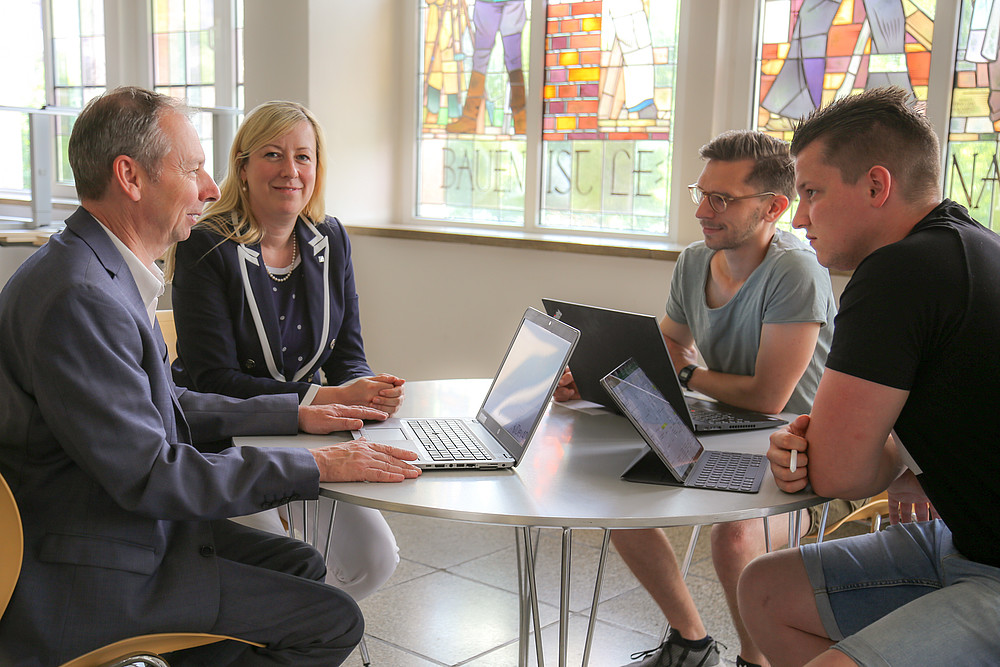Prof. Keil and his team are working with high-tech experts to develop teaching scenarios to increase students' digital skills.

The increasing and continuously advancing digitalization of business processes and models in the economy is changing the requirements for existing and future employees. Zittau/Görlitz University of Applied Sciences is working to reflect this in innovative teaching and to train students competently with a deep understanding of new technologies in the context of Industry 4.0. To this end, the team, led by project manager and Dean Prof. Keil, is developing new teaching/learning scenarios. In order to create practical scenarios, the existing collaboration with two experts from industry and science was further intensified in the form of guest lectures and working meetings. On May 27 and 28, 2019, the Faculty of Business Administration and Engineering Management welcomed a very special guest. Michael Spitzer from the Virtual Vehicle Research Center in Graz is an expert in the field of "Extended Reality" and works together with Dean Prof. Keil and her research group in the European research project "iDev40" (Integrated Development 4.0) on the design of the workplaces of the future ("Workplaces 4.0").
The working meeting focused on use cases for the Microsoft HoloLens in production. These mixed-reality glasses not only allow the user to display 3D projections in the immediate environment, but also to interact with these virtual objects. For this purpose, Mr. Spitzer had prepared a HoloLens with specially programmed applications. Faculty W would like to cooperate more closely in this area and test various application scenarios first with students and later with employees from cooperating companies. These HoloLens applications will then be incorporated into the design of teaching at the faculty and into the design of digitally enhanced workstations.
To this end, a pre-test was first carried out with six students from three faculties (Faculty of Business Administration and Engineering, Faculty of Electrical Engineering and Computer Science). The students were asked to assemble a Lego model of a planetary gearbox with the help of various instructions in order to find out how the type of instruction affects the execution of the assembly. A paper instruction, a video instruction and an instruction using the Microsoft HoloLens were compared. The findings from the pre-test are now being incorporated into the design of the test series with the successor model to the Microsoft HoloLens.
In addition to further professional exchange with colleagues from the faculty, Mr. Spitzer also gave a guest lecture on the "Use of augmented reality in vehicle development and production" using a live demonstrator on the Microsoft HoloLens. This was very well attended by students, colleagues and the public.
On June 20, the faculty welcomed Dr. Germar Schneider from Infineon. He works in semiconductor production in Dresden and is an expert in automation and digitalization.
First, Professor Keil and her research group met with Dr. Schneider in the morning to continue working on innovative teaching/learning scenarios. Not only the research group was to benefit from the expertise, so that students were also able to attend a guest lecture in the early afternoon. The lecture covered topics including automation, the basics of the semiconductor market and manufacturing, research & development in the high-tech industry, as well as the opportunities and risks of digitalization for the future world of work and companies.
We are extremely grateful to Mr. Spitzer and Dr. Schneider for the time and expertise they brought to Faculty W and look forward to continuing to work together on joint research projects.
The iDev40 project has received funding from the ECSEL Joint Undertaking under grant agreement No 783163. The JU is supported by the EU's Horizon 2020 research and innovation program and is co-funded by the consortium partners as well as funding from Austria, Germany, Belgium, Italy, Spain and Romania. The project coordinator is Infineon Technologies Austria AG.



